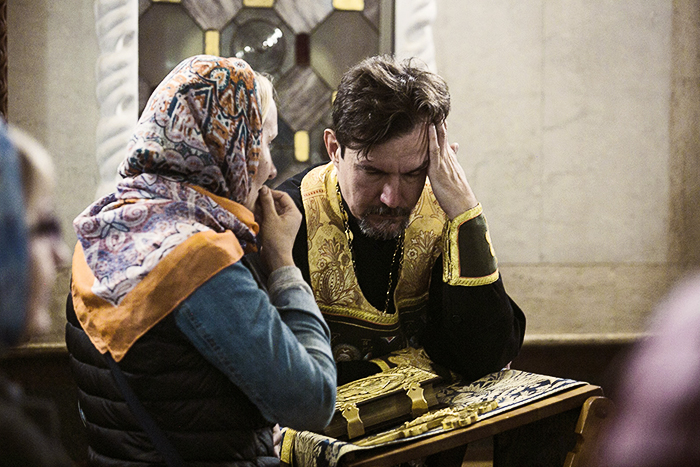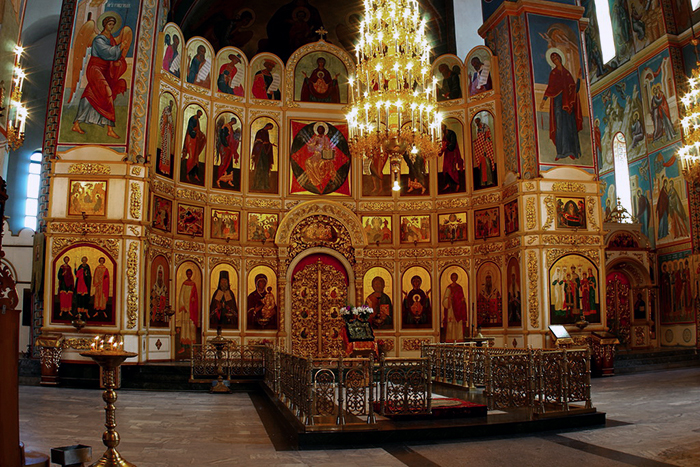
Choosing a spiritual father and a parish is not easy. In this issue, not only circumstances common to everyone are important, but also a person’s personal characteristics: his interests, habits and many other things. Spiritual life, in general, is too complex to give universally applicable advice in it.
But at the same time, there are a number of things that everyone should pay attention to. They will make it possible to avoid the most frequent mistakes during getting churched, and will keep one from getting into the pseudo-Orthodox sect instead of the Church.
Love
In the Gospel, the Lord himself gives simple but very true advice on what is the main distinguishing feature of Christians. The Savior reminds the apostles: By this shall all men know that ye are my disciples, if ye have love one to another (John 13). It is by this criterion that one should look for a parish and a spiritual father.
You should not hope that you suddenly come across a church where only saints go to. We note here that even the saints had their sins and shortcomings. Therefore, in order not to be disappointed, one should not have illusions from the very beginning: in any human community there is always misunderstanding, as well as conflicts and tensions. The only question is their degree. A parish, like any other organization or group, can equally turn out to be either a union of normal, lively (and therefore not without communication problems) people, or a “terrarium of the like-minded”.
After coming to church, you are unlikely to immediately understand all the intricacies of the relationship between the regular parishioners; this will take time. However, you can immediately notice if the parish has problems with other communities and the Church as a whole. The idea of a besieged fortress or the only “right” parish can take many different forms, but this is always a case to beware. To contrast yourself with the rest of the Church, to claim that only your Father Superior has the ultimate truth – a sure step towards a secret sect under the Orthodox sign.
Freedom
A parish is not an army barrack where everyone is subordinate to the fulfillment of the commander’s will, and where subordinates should not think at all. The task of a spiritual father is to teach a person to think and to make decisions by himself. Therefore, good spiritual father will give advice rather than orders and will help the parishioner with his self-education. And he will never shoot from the hip.
Unfortunately, there are such cases when, upon seeing the parishioner for the first time, the priest order him to go to a monastery or to ask a stranger to tie the knots. Often these priests are surrounded by people who tirelessly repeat that “the father is a foresightful elder” and one must do everything he says. However, do not forget that such an attempt to break the will of others does not correspond to the concept of the life of a Christian; moreover, it is condemned by the conciliar decision of the Church.
The Decree of the Holy Synod of the Russian Orthodox Church of December 28, 1998 indicates that it is inadmissible for priests to persuade parishioners to abandon their studies, work or military service, to be tonsured a monk, to marry, to make any donations. Of course, you can consult with the priest on any of these topics, and he will give you an answer, but he has no rights to force you to do anything.
Orthodoxy is a religion of freedom. However, do not forget that if you make a free choice in favor of evil, you will be responsible for it yourself.
“Work with Sources”
No priest, even the most experienced one, can say things that contradict the Holy Scriptures, the canons of the Church and its conciliar decisions. Therefore, the best protection against getting into a pseudo-Orthodox sect may be work with “several sources”. Trust your spiritual father, but at the same time read the Gospel and the interpretations of authoritative theologians, do not avoid educational courses, even if they are outside your parish. Do not be afraid to consult not only with yours, but also with other priests.
There is nothing sinful in the fact that you strive as fully as possible to study your faith, including information from the primary sources. On the contrary, education is one of the most important pillars of a Christian’s spiritual growth.
But be careful at the same time. Do not let yourself go to other extreme: do not think that after a couple of weeks of studying at the catechetical courses you will surely start to understand everything better than your parish priest. Experience tells that a newly converted Christian who does not have the proper education and experience, may understand mistakenly a particular place in the Scriptures, out of ignorance, misinterpret the words of the Church Fathers or the decision of some council. In such a situation, you are one step away from unfair condemning your spiritual father, and even the whole Church. A number of tragic dissents arose precisely in this way, due to the illiteracy of people armed with “half-knowledge”.
Therefore, if something in the words of your spiritual father confuses you, try to check and double-check this in the maximum possible number of ways.
Getting Churched instead of Subculture
A common mistake of a person entering the Church for the first time is trust in those who are sometimes called church freaks.
Indeed, the Church has its own traditions, even its own principles: there is nothing strange in it. Today, on the contrary, sometimes it is the Church that acts as the guardian of all the best that we have left of traditional society. However, firstly, the Church is not some kind of keeper of antiquity or some special subculture. A man got churched does not have to grow a beard and start to say “God save you” instead of the usual “thank you”. And, secondly, the degree of spiritual growth and closeness to Christ is not determined by the length of the beard or skirt.
A newly converted Christian has a lot of questions: why fast, how to behave in church, how to pray before eating? Much seems unusual to him, and this needs to be dealt with. Including in order to learn to distinguish actions important for a Christian from exhalted behavior.
Remember Dostoevsky’s novel The Brothers Karamazov. The true elder Zosima speaks there in a completely understandable language, does not try to play the fool (fool-for-Christ), even though people far from the Church suspect him of this and do not understand many of his actions. At the same time, his opponent – a monk – clearly suffering from many spiritual illnesses, attracts people with his strange behavior, tales of revelations, and acting attempts of portraying a popular saint.
Above Any Party
The church is out of politics. Of course, it cannot avoid any clashes with politics; and conversations on relevant topics will also arise periodically, because they are conducted by people everywhere. However, when political topics start to dominate in the life of a parish, that is a red flag. After all, let’s say, you go to a hairdresser to get a haircut, and not just to hear political slogans (even the closest to you personally) from the mouth of a hairdresser. If for your money they talk with you about politics, but do not give you a haircut, you will be indignant reasonably.
It is same with the Church. Please note that today famous priests relate to public topics, but whatever they start talking about, the main purpose of their speech is Christ and His sermon. For the sake of this, the priest can turn to the problems of economics, and to issues of a political nature, and to ecology, and to modern art. But the purpose of the conversation should remain a Christian understanding of the problem, that is, ultimately, a conversation about God and eternal salvation, and not about someone to vote for.
And, of course, it is absolutely unacceptable if “rejecting” of people on political grounds begins in a parish. After all, partaking of the Holy Communion, all Christians are equal brothers who left momentary disputes in the name of eternity.
Translated by The Catalogue of Good Deeds
Source: https://foma.ru/kak-vyibirat-duxovnika-i-prixod.html



